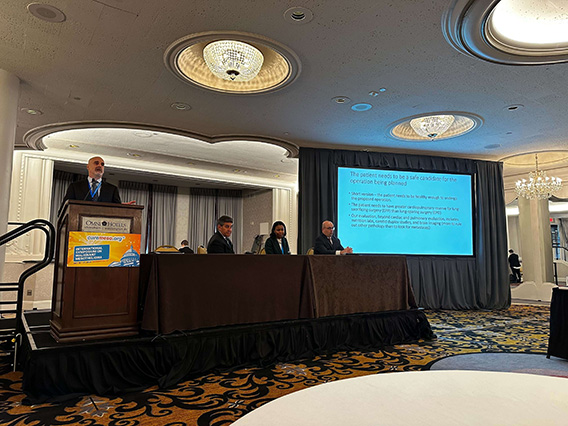Highlights of the 2023 International Mesothelioma Symposium
Treatment & DoctorsWritten by Sean Marchese, MS, RN | Edited By Walter Pacheco

Last month, the Mesothelioma Applied Research Foundation held this year’s International Symposium on Malignant Mesothelioma in Washington, D.C.
Our team of Patient Advocates and I, along with other team members from The Mesothelioma Center, learned about the latest treatment updates and heard from several experts in the mesothelioma community as well as mesothelioma survivors and their loved ones.
The discussions throughout the conference weekend explored novel mesothelioma therapies, screening and surveillance, genetic mutations and more. At the end of each session, the expert physicians also formed panels to discuss unique case studies and answer audience questions.
MARF’s symposium is an excellent opportunity to hear from expert physicians leading the charge to discover the newest and best ways to treat asbestos-related diseases. It’s also a chance to hear from patients and family members about their experiences and concerns. Attending these conferences is a chance to learn from the best and bring that information back to you.
Conversations on Latest Pleural Mesothelioma Treatments
Dr. Joseph Friedberg, a thoracic surgeon at Temple Health, opened the pleural mesothelioma panel. He explained that MARS2 clinical trial patients who received chemotherapy alone survived about two years. Friedberg believes surgery must benefit patients beyond that point to be considered a standard of care.
“Selecting patients for surgery is still more art than science,” said Dr. Friedberg. Following Friedberg’s presentation, Dr. Ibiayi Dagogo-Jack, a Massachusetts General Hospital medical oncologist, spoke about the benefits of immunotherapy.
While immunotherapy targets cancer in ways chemotherapy cannot, side effects remain a consideration. Although about twice as many people stop immunotherapy than chemotherapy due to a side effect, immune treatment can continue working in the body after treatment has ceased.
Dagogo-Jack also discussed the other options, including vinorelbine and gemcitabine, for patients when neither platinum chemotherapy nor immunotherapy are effective. “This is also the time we start talking to patients about clinical trials,” she said.
Continuing the discussion on clinical trials, Dr. Daniel Sterman, an interventional pulmonologist at the New York University Langone Medical Center, spoke about the differences between trial phases and patient benefits.
“One of the key questions we all face is, ‘Is surgery appropriate?’” Sterman said. “Unfortunately, the MARS2 trial did not answer that question.”
Sterman concluded that when evaluating whether surgery is right for you, it’s best to determine if the procedure aligns with your goals. Consider your future quality of life and, if possible, talk to another patient who shares a similar lifestyle and underwent the same surgery.
Updates on Mesothelioma Radiotherapy and Imaging
Dr. Christopher Straus, a professor of radiology at The University of Chicago, led the radiology panel by explaining the physics and history of X-rays, CT scans, PET scans and MRIs. An essential distinction in his presentation was that cancer progression is when cancer has grown by at least 20%. Treatment response is defined as tumor shrinkage by at least 30%.
Recent technology, such as artificial intelligence, is helping radiologists better understand how and where tumors are found on imaging. Dr. Charles Simone, a New York Proton Center radiation oncologist, discussed how AI can trace abnormalities to predict how tumors might grow.
Simone also discussed the differences between identifying inflammation from radiation therapy versus tumor growth on imaging. “That’s where we work with our colleagues in radiology to understand the evolution of changes over time after treatment,” Simone said.
One of the ways radiation oncologists optimize patient outcomes is through serial imaging during therapy. By performing a series of imaging scans, doctors can look for changes in tumors and normal tissues to determine if a change in the treatment plan is needed. In the future, AI may assist with automatic replanning based on the tumor boundaries.
New Conversations About Peritoneal Mesothelioma
Peritoneal mesothelioma patients face unique challenges compared to those with pleural disease. “It’s important to recognize that clinical trials for peritoneal mesothelioma are very limited,” said Chief of Surgical Oncology at Yale School of Medicine Dr. Kiran Turaga.
One study called ICARUS2 aims to study the effects of early postoperative intraperitoneal chemotherapy (EPIC) in which patients receive chemotherapy through the abdomen for three days after tumor removal surgery. The research will compare the results with HIPEC, the standard method of chemo delivery during surgery for peritoneal mesothelioma.
Another peritoneal-focused study at the National Institute of Health is focused on individualizing peritoneal therapy for each patient. Researchers use tissues removed during surgery to simulate HIPEC with different drug combinations in a lab. It’s the first step in personalizing therapy for each patient.
The peritoneal panel mostly focused on the need for more education among general surgeons and primary care physicians related to the disease. Peritoneal mesothelioma represents 20% to 30% of all mesotheliomas. Doctors on the panel also discussed the reality of those with both pleural and peritoneal disease.
Turaga shared how treatment approaches for patients with cancer in the chest and abdomen must be treated for their primary cancer first, depending on severity. “You can clean the abdomen, then the chest and then the other side. Despite doing multiple surgeries, patients can actually live very long,” Turaga said.
The MARF symposium provided a wealth of knowledge about the ongoing advancements in research and treatment. It was also a reminder that there is still much room for improvement, such as opening more multicenter trials, improving technology such as AI and identifying more opportunities for peritoneal patients.






